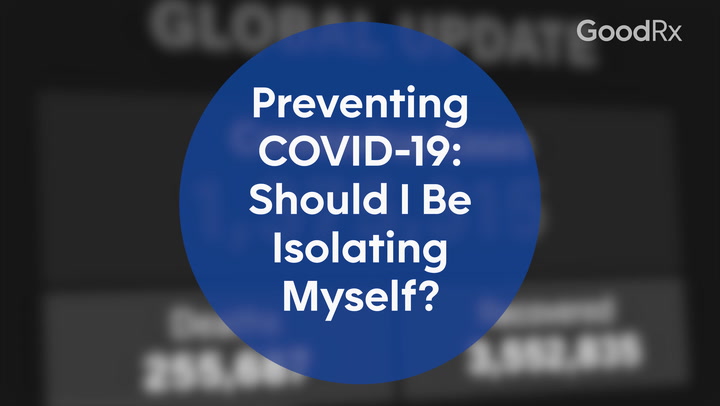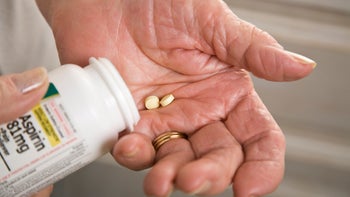
7 Aspirin Side Effects You Should Know About
Key takeaways:
Aspirin is one of the oldest pain relievers available — but it’s not safe for children. At low-doses, aspirin can help prevent heart attacks and strokes in people at high risk.
Heartburn and upset stomach are common aspirin side effects. Taking your dose with food may help. But there’s no evidence that enteric-coated or buffered versions of aspirin are safer for your stomach than traditional aspirin.
Serious aspirin side effects include stomach ulcers, kidney problems, and unusual bleeding or bruising. Talk with your healthcare provider or pharmacist before taking aspirin on a regular basis.
Table of contents

Aspirin is one of the oldest and most commonly used medications in the world. At regular doses, this nonsteroidal anti-inflammatory drug (NSAID) can help relieve fever, pain, and inflammation. But at low doses, aspirin works as a blood thinner and can help prevent blood clots.
Even though aspirin is sold over-the-counter (OTC), it’s not safe to take daily aspirin without talking with your healthcare provider. And you may have heard people call the 81 mg dose “baby aspirin” — but you should never give children aspirin unless their provider tells you to.
Whether you’re taking aspirin occasionally or every day, aspirin has some side effects you should know about. Here, we’ll discuss seven important ones, so you can stay safe while taking aspirin.
1. Heartburn or stomach upset
The chemical makeup of aspirin is acidic. This partly explains why aspirin might bother your stomach or cause heartburn.
Another reason is that aspirin blocks an enzyme (protein) called cyclooxygenase. This leads to lower levels of prostaglandins — chemicals in the body that promote inflammation. But in the stomach, certain prostaglandins protect the lining. Fewer prostaglandins means the stomach lining may be more easily irritated.
Follow your healthcare provider’s instructions for taking aspirin. Here are some general steps that may help you avoid stomach troubles:
Take your dose with a full glass of water just after a meal.
Limit alcohol while taking aspirin.
Don’t take aspirin with other NSAIDs, such as ibuprofen (Advil, Motrin).
You may have heard of enteric-coated (EC) aspirin forms. Their protective coating prevents aspirin from getting absorbed until it's past your stomach. Buffered aspirin contains an antacid ingredient and is also supposed to protect your stomach.
Clinical studies, however, don’t find EC or buffered aspirin products to be any safer for your gut. What’s more, if you’re taking aspirin for your heart, EC aspirin might not protect you as well as uncoated aspirin.
Vazalore is a newer aspirin option that works just as well as plain aspirin, but has a lower risk for GI side effects. It comes as an OTC oral capsule. If you're having trouble taking your daily aspirin because of heartburn, you might want to discuss this option with your healthcare provider or pharmacist. Let your provider know about any persistent or severe heartburn or stomach pain. These can be symptoms of stomach ulcers.
2. Stomach ulcers
Like other NSAIDs, aspirin can cause stomach ulcers or bleeding. Over time, lower levels of prostaglandins can weaken the lining in your stomach. And if an ulcer forms, it’s more likely to bleed while you’re taking aspirin.
Your risk for ulcers is higher if you’re older than 65 or have a history of ulcers. Ulcer symptoms include stomach pain, nausea, and feeling full. You might be bothered by heartburn, too. If the ulcer bleeds, your stools might look darker in color, even black and tarry.
To prevent ulcers, follow the steps mentioned above for protecting your stomach. If you’re taking aspirin for general pain relief, consider taking an ulcer-safe option, such as acetaminophen (Tylenol).
Talk with your provider about your risks for ulcers if you’re taking aspirin regularly. If your risk is high, they might recommend taking a proton pump inhibitor (PPI) to protect your stomach. But this combination isn’t right for everyone at risk for ulcers. Only take aspirin with a PPI if your provider has recommended this.
If you have any symptoms of an ulcer, it’s important to have it checked out right away. Early treatment can help keep you safe from serious complications.
3. Unusual bleeding or bruising
Aspirin prevents platelets from sticking together, making clots less likely to form. Having “thinner” blood can help prevent heart attacks and strokes. But there’s a downside: your risk for bleeding problems is higher.
You’re more likely to bleed while taking aspirin if you:
Are older than 60 years old
Are male
Have a history of stomach ulcers or bleeding problems
Have diabetes or high blood pressure
Have severe kidney or liver problems
Smoke or drink three or more alcoholic beverages per day
Take other medications that increase your bleeding risk, like steroids, other NSAIDs, or other blood thinners
Talk with your healthcare provider or pharmacist before taking aspirin if you have a higher risk for bleeding. Make sure they have your complete health history and current medication list. This will help them accurately weigh your risks when considering if aspirin is safe for you.
Keep in mind: If you’re planning a surgery, you may need to stop taking aspirin before the surgery to lower your risk for bleeding complications. Discuss this with your provider and follow their instructions closely.
4. Kidney damage
As with other NSAIDs, taking aspirin can be hard on your kidneys. Your risk is higher if you’re also taking blood pressure medications that affect your kidneys, like angiotensin-converting enzyme (ACE) inhibitors or angiotensin II receptor blockers (ARBs).
Keep in mind, low-dose daily aspirin is unlikely to cause kidney problems. Kidney damage is a greater concern if you’re taking higher aspirin doses (325 mg or more daily) or already have low kidney function. To be safe, consider a kidney-friendly OTC pain reliever, such as acetaminophen, if you have issues with your kidneys.
5. Reye’s syndrome in kids
Never give aspirin to kids and teens, unless specifically told to do so by their healthcare provider. In people under age 19, aspirin can cause Reye’s syndrome if they take it while recovering from a viral illness. But note that your child might have a viral illness without you knowing, or without them even feeling sick. So it’s best to avoid it altogether.
Reye’s syndrome is rare but very serious. It can lead to brain swelling, liver damage, and even death. To be safe, choose another pain or fever medication for your child or teen. Ibuprofen and acetaminophen are aspirin-free options.
6. Aspirin sensitivity
About 10% of people with asthma have an aspirin sensitivity called aspirin-exacerbated respiratory disease (AERD). The risk is three times higher in people who have both asthma and nasal polyps.
If you have AERD, you might notice a stuffy nose or worsening asthma symptoms after taking aspirin. This can happen with other NSAIDs, too. It’s also possible to be sensitive to aspirin even if you don’t have asthma.
If you develop mild symptoms after taking aspirin — such as a minor rash or stuffy nose — tell your provider. But for severe symptoms, call 911 or get immediate medical attention.
7. Ringing in the ears
Tinnitus (ringing in the ears) is a rare aspirin side effect. It’s usually caused by taking high aspirin doses for a long time. While generally not harmful, it can be frustrating. The good news is it’s reversible when you stop taking aspirin. Tell your healthcare provider if you develop tinnitus while taking aspirin.
When should I contact my healthcare provider about aspirin side effects?
Contact your healthcare provider if you have severe or persistent stomach pain. You should also reach out to them if you notice you’re bleeding or bruising more easily while taking aspirin.
Serious bleeding always requires medical attention. Seek medical help if you have any symptoms of internal bleeding, including:
Coughing up blood (may look bright red or darker in color)
Blood in your urine (may look red or pink)
Blood in your stools (may look red, black, or similar to coffee grounds)
Other reasons for getting emergency medical help include symptoms of a severe allergic reaction. These can include facial swelling, trouble breathing, or hives.
The bottom line
Common aspirin side effects include heartburn, upset stomach, or easier bruising. Serious side effects include ulcers, serious bleeding, and kidney damage. Never give aspirin to children or teens without a healthcare provider’s OK. People under 19 can develop Reye’s syndrome from aspirin.
Your risk for certain aspirin side effects depends on your health history and other medications you may be taking. Discuss whether aspirin is right for you with your healthcare provider and pharmacist.
Why trust our experts?



References
American Academy of Allergy, Asthma and Immunology. (2020). Aspirin-exacerbated respiratory disease (AERD).
Arif, H., et al. (2023). Salicylic acid (aspirin). StatPearls.
Arnett, D. K., et al. (2019). 2019 ACC/AHA guideline on the primary prevention of cardiovascular disease: A report of the American College of Cardiology/American Heart Association Task Force on clinical practice guidelines. Journal of the American College of Cardiology.
Cardinal Health 110, LLC. (2023). Buffered aspirin [package insert]. DailyMed.
Clerici, B., et al. (2023). Pharmacological efficacy and gastrointestinal safety of different aspirin formulations for cardiovascular prevention: A narrative review. Journal of Cardiovascular Development and Disease.
Desborough, M. J. R., et al. (2017). The aspirin story – From willow to wonder drug. British Journal of Haematology.
Drini, M. (2017). Peptic ulcer disease and non-steroidal anti-inflammatory drugs. Australian Prescriber.
Ediriweera, D. S., et al. (2018). Aspirin is associated with low oral pH levels and antacid helps to increase oral pH. BMC Research Notes.
Geri-Care Pharmaceutical Corp. (2022). Adult low dose enteric coated aspirin [package insert]. DailyMed.
National Center for Biotechnology Information. (2023). Aspirin.
U.S. Preventive Services Task Force. (2022). Aspirin use to prevent cardiovascular disease. Journal of the American Medical Association.
Whitlock, E. P., et al. (2016). Bleeding risks with aspirin use for primary prevention in adults: A systematic review for the U.S. Preventive Services Task Force. Annals of Internal Medicine.
Was this page helpful?
Related Articles
Browse medications
View AllResearch prescriptions and over-the-counter medications from A to Z, compare drug prices, and start saving.




























